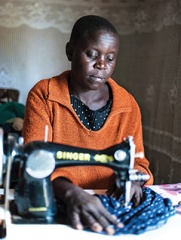What happens when you give the equivalent of one year’s household budget—no strings attached—to extremely poor people in rural Kenya? Will they use the money to purchase basic needs such as food, clothing, and shelter? Or will they squander the money on alcohol and cigarettes or some other nonessential item or activity?
The latest issue of IFPRI’s Insights Magazine includes a feature article on how best to design safety net programs for the most vulnerable people. One approach it looks at is unconditional cash transfers.
Since 2011 the nonprofit GiveDirectly has provided about US$1,000 per family to more than 12,000 households throughout rural Kenya, unconditionally. The money was disbursed in multiple installments from a mobile money agent.
After buying a blanket, one person was finally able to sleep well. Another bought a secondhand motorbike to use for business. A grandmother paid the school fees for her orphaned grandchildren. “My life has generally changed as I now eat well also,” another recipient told a fieldworker. Some of the recipients invested in livestock and small businesses. Revenue from animal husbandry rose by 48 percent, and total revenue from self-employment climbed by 38 percent a month. Many GiveDirectly recipients spent their large unconditional transfers on new tin roofs.
“This runs counter to the idea that cash transfers get wasted,” said Johannes Haushofer, assistant professor of psychology and public affairs at Princeton University, who co-wrote the study on GiveDirectly’s program.
Cash grants generally were not frittered away by the poor families who participated in the program. Instead, recipients often spent their money on basic items like food, better shelter, healthcare, and education. With food consumption up by 20 percent, the likelihood of going to bed hungry in the preceding week dropped by 30 percent, and the number of days children went without food fell by 42 percent.
“To the casual donor in the Western world, giving money to the poor and letting them do what they want with it is really challenging,” says Paul Niehaus, cofounder and president of GiveDirectly, as well as assistant professor of economics at the University of California, San Diego. “It flies in the face of received wisdom.”
Niehaus wasn’t surprised that people were able to take the money, invest it, and see their incomes rise. What surprised him was that the number one investment people made was a roof upgrade.
Many Kenyans in the program replaced thatched roofs with a corrugated tin roof. The upgraded roofs were a wise investment because they were cheaper than buying new thatch for the roof every year, he says. It helps that the metal roofs last longer, do not require yearly upkeep, and do not leak. What’s more, rainwater from the roof can serve as a water source.
Among other benefits, the cash infusion led to documented improvements in psychological well-being. The researchers saw evidence of increases in happiness and decreases in depression. In some of the treatment groups, the researchers also saw decreases in cortisol, a major stress hormone.
“We should think about the impact of programs not just in terms of economic outcomes, but also in terms of welfare on the psychological level,” says Haushofer. Such indicators, he says, shed light on facets of well-being beyond commonly measured economic outcomes such as consumption, assets, and labor market outcomes.
One thing that makes GiveDirectly’s program stand out is the size of the transfer, says Daniel Gilligan, deputy director of IFPRI’s Poverty, Health, and Nutrition Division: “They’re massive.” People tend to use one-time, large person-to-person transfers differently than they use periodic cash grants, he notes. “People’s behavior around those two modalities could be really different,” he says.
Findings on GiveDirectly reveal as much. Monthly transfers were more likely to increase food security, while lump-sum transfers led to larger purchases, such as metal roofs.
“Part of what I like about GiveDirectly is they’re playing with the formula,” says Gilligan. “And I think a lot of people should be doing that.”
More experimentation, he says, would help us figure out what works best, given what we’re trying to achieve.
For more about safety nets and cash transfers, go to the full article.







